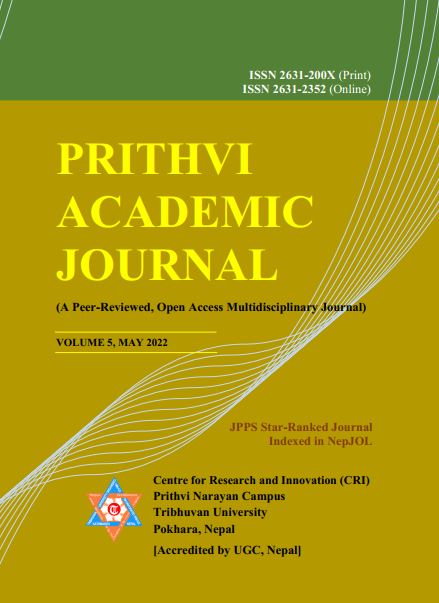COVID-19 Pandemic and the Impact of Quarantine on Mental Health of Adult Population
DOI:
https://doi.org/10.3126/paj.v5i1.45041Keywords:
COVID-19 pandemic, mental health, quarantine, adult populationAbstract
A new infectious disease known as coronavirus disease (COVID-19) is posing a serious public health threat worldwide. Isolation and quarantine are two important public measures to prevent transmission of coronavirus from one person to another. A new environment, a departure from loved ones, and insecurity over disease status in quarantine can aggravate mental health problems. The study was descriptive cross-sectional that covered 305 adult populations of Rupa Rural Municipality, Kaski to determine the impact of quarantine during the COVID-19 pandemic in relation to their mental health. The researcher used the self-reporting DASS-21 to collect the data through a web-based google form questionnaire from 1 September 2020 to 1 October 2020. The study demonstrated that 60.7 percent of respondents were below 35 years of with mean age of 33.92 years with a standard deviation of 11.702 and exercise was done by 53.1 percent of respondents. The study also revealed that 95.1 percent of respondents were up to date regarding the COVID 19 trend in Nepal mostly through a social network (37.9%). Among the quarantined group, 24.9 percent, 20 percent and 1.2 percent had depression, anxiety and stress respectively whereas among non-quarantined respondents, 5.7 percent had depression, 12.9 percent had anxiety and 1.4 percent had stress. Binary logistic regression resulted in the odds for respondents with depression who did not do physical exercise are 0.27 (95% CI for OR: 0.115-0.645) and the odds for female respondents are 0.219 (95% CI for OR: 0.08-0.595) with anxiety among the quarantined group. The study concluded that the negative impact on quarantined respondents' mental health was higher than that of the non-quarantined respondents. Hence, a psychological counseling using virtual techniques should be offered especially for those under quarantine, which would comfort them and follow-up care as well as mental health services that can be provided as necessary.
Downloads
Downloads
Published
How to Cite
Issue
Section
License
Copyright (c) 2022 Authors and Centre for Research and Innovation (CRI)

This work is licensed under a Creative Commons Attribution 4.0 International License.




